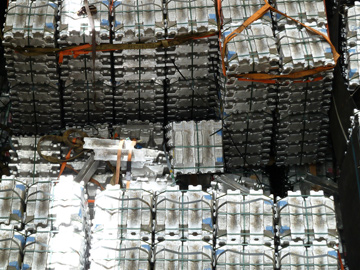
Following a stevedoring fatality, the ATSB has issued two safety advisory notices to stevedoring companies, highlighting the risks of break-bulk cargo toppling and of stevedore fatigue.
On 23 September 2012, a team of stevedores was loading aluminium ingots in the cargo holds of the general cargo ship Weaver Arrow, which was berthed in Newcastle, NSW. The ingots, each weighing about 23 kg, were strapped into 1-ton ‘packs’ of 44. Multiple packs (20 or 24) were strapped together to form a cargo unit or lift.
The stevedore team leader was climbing down the ingot packs of a lift to work on a lower tier of the cargo when another member of the team saw the stack move. He yelled a warning, urging the team leader to jump. As the packs he was climbing down toppled, the team leader either jumped or fell to get clear. However, the adjacent stacks also toppled over in quick succession and packs from those crushed the team leader.
Other stevedores raised the alarm and tried to help the crushed man but he showed no signs of life. Paramedics and police officers arrived on the scene shortly afterwards and confirmed that the stevedore was dead.
No work should be undertaken in the vicinity of ingot stacks unless they have been secured
to prevent toppling.
The ATSB investigation found that it was common for some stevedores to climb up or down ingot packs to work on different cargo tiers instead of using the ladders provided. This was despite the fact that the ingot cargo units or lifts were inherently unstable and prone to toppling over. The stevedoring company’s procedure for loading aluminium products did not adequately address the risk of the cargo toppling over, and the implementation of basic precautions, such as using ladders to climb between cargo tiers, was not effectively monitored or enforced.
The ATSB also found that stevedores often worked extended hours, exposing the company’s operations to a level of fatigue-related risk that had not been assessed and treated.
In response, the stevedoring company, the company responsible for preparing ingot packs for loading, and the company managing Weaver Arrow have taken steps to make cargo handling—ingots in particular—safer. The ATSB has promulgated a safety message to industry that individual stacks of aluminium ingots and other similar break-bulk cargoes (whether or not strapped together for carriage on ships) should always be considered unstable and prone to toppling over. No work should be undertaken in the vicinity of ingot stacks unless they have been secured to prevent toppling. The ATSB has also recommended that Newcastle Stevedores address the issue of stevedore fatigue.
Unsafe marine work practices are a continuing concern in Australia. The ATSB has investigated several maritime accidents over the past few years that have resulted in serious injury or death. Through its SafetyWatch initiative, the ATSB is urging the maritime industry to give heightened attention to the ongoing safety issues facing marine workers.
Read the report: Stevedore fatality on board the general cargo ship Weaver Arrow, at Newcastle, New South Wales, on 23 September 2012


